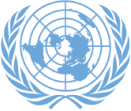The delegation of Guyana welcomes the consideration of agenda item 50, “The role of the United Nations in promoting a new global human order”.
The new global human order is concerned with a human development dilemma — in an era of unprecedented global prosperity and expanded opportunity, billions of people face poverty and despair, bypassed by the benefits of globalization. It is concerned also with the growing disparities between rich and poor, among and within countries, and about what that means for human development and the fulfilment of the Charter objective of higher standards of life in larger freedom. Those are challenges that we believe must be addressed if we are to create a global environment in which people everywhere are better placed to develop their potential and to contribute to their societies and to the achievement of progress worldwide.
Those considerations inspired Guyana’s formal submission of the proposal for a new global human order in the General Assembly seven years ago. The submission coincided, interestingly, with the adoption of the Millennium Declaration. The latter event signalled a renewed global commitment to the implementation of the development agenda and the restoration of core issues of development cooperation to the heart of the United Nations work in the twenty-first century.
In the period that has elapsed, global events and trends of particular consequence to the realization of the Millennium Development Goals (MDGs) have given cause for reflection and concern. Today, at the midpoint of the 2015 calendar, despite appreciable gains in some areas, the prospects for attainment of the MDGs remain uncertain, with many countries falling behind on several of the goals, human development indicators falling in key areas and the already deep gap in inequalities and inequities widening. These developments attest to the increased need for initiatives such as the new global human order in the quest for a world free from want.
In the context of a globalized world, increased interdependence is axiomatic and the necessity for intensified international cooperation imperative. Despite the expanded opportunities and the growing prosperity occasioned by globalization, increasing inequality among and within countries is a regrettable feature of the contemporary global order. The full benefits of globalization must be harnessed for all. Otherwise, vulnerable economies will be exposed to the risks of devastation, social and economic disparities will be further widened, and the promise of greater prosperity, peace and security and the enjoyment of human rights will remain unfulfilled for many of the world’s people.
The new global human order aims at providing a framework for integrating different aspects of development — economic, environmental, social, cultural and political — through a holistic approach linking disparate but related initiatives and proposals. Premised on partnership, interdependence and people-centred development, it aims at expanding common ground and advancing practical measures for effective and coherent implementation of international development policy.
In this regard, particular attention, we believe, needs to be paid to the following issues. New and additional resources for development need to be mobilized. There needs to be greater coherence in international economic cooperation, including through the strengthening of the United Nations so that it can play a more dynamic role, as envisaged by the Charter. Implementation of the commitments emanating from United Nations global conferences needs to be enhanced. The democratization of global institutions also needs to be enhanced. A fairer global trading regime to accelerate global growth needs to be promoted, thereby allowing for a more equitable distribution of benefits. And finally, military expenditures need to be reduced in favour of greater investment in human development.
It is Guyana’s view that the magnitude and complexity of the development challenge points to the need for a qualitatively different approach to international cooperation that takes into account the recognized shortcomings of previous global strategies. Today, consensus-building, enhanced cooperation among all relevant actors and multilateral solutions to common problems are more vital than ever. The United Nations Charter mandates the Organization to address political, security, economic, social, cultural and humanitarian issues in a holistic manner, bearing in mind their recognized interrelationships. A key challenge in this regard would be to address global disparities in a comprehensive and sustainable manner.
Let me say a few words in introduction of the draft resolution that is before the Assembly, entitled “The role of the United Nations in promoting a new global human order”, contained in document A/62/L.35.
In the preambular part of the draft resolution, the Assembly, among other things, would recognize that the well-being of people and the full development of their potential is pivotal to sustainable development and would express its deep concern about the growing disparities between rich and poor and about the adverse implications thereof for the promotion of human development throughout the world. In recognizing the action under way and the progress made to implement the internationally agreed development goals, including the MDGs, the Assembly would also recognize that the achievement of many of these goals is currently off track and that vigorous implementation of all development commitments will be needed to achieve the goals.
In the operative part, the Assembly stresses the need for a broad-based consensus for action within a comprehensive and holistic framework towards the achievement of the goals of development and poverty eradication involving all actors, namely Governments, the United Nations system and other international organizations and relevant actors of civil society, including the private sector and non-governmental organizations.
It notes with interest the proposal regarding a new global human order, recognizes that inequality within and among countries is a concern for all countries regardless of their level of development and requests the Secretary-General to submit to the General Assembly at its sixty-fifth session a report on the implementation of the resolution and to include in that report an assessment of the implications of increasing inequality for development, peace, stability and international economic cooperation.
In conclusion, my delegation takes this opportunity to express our sincere appreciation to delegations for the flexibility and spirit of accommodation shown throughout the many informal consultations held on this draft resolution, which have led us to the result before us today. We offer special thanks to the delegations that have joined in sponsoring this text.
It is now my honour to commend draft resolution A/62/L.35 to the General Assembly for adoption by consensus.


